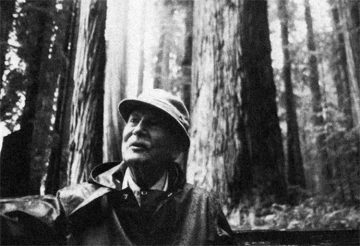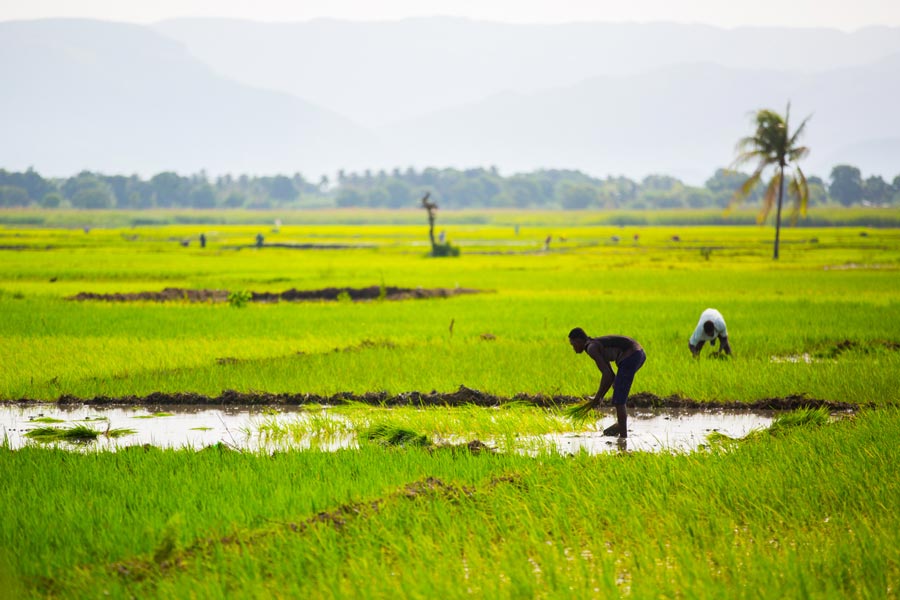The views expressed in our content reflect individual perspectives and do not represent the authoritative views of the Baha'i Faith.
A profession, a trade, farming, these are worshipping God. A farmer who cultivates his land with the utmost application is like a worshipper who with deepest reverence and humility prays to God in a temple. When the labourer works honestly and sincerely it is as though he were praying. – Abdu’l-Baha, Star of the West, Volume 8, p. 168.
Hugh Locke’s Baha’i-inspired environmental activism began when he was a university student in England, and then became the famous environmentalist Richard St. Barbe Baker’s assistant during the last five years of his life. St. Barbe Baker, the Baha’i known globally for his Men of the Trees movement (now called the International Tree Foundation), became Locke’s inspiration and mentor, instilling a deep awareness of the importance of trees and forestry in him. After St. Barbe passed away, Locke led Canada’s national youth service program for tree-planting; then went to work for the Baha’i International Community office affiliated with the United Nations in New York.

There, Locke says, “I initially focused on humanitarian service work, then I looked around and saw there were no trees left in some of the world’s most impoverished areas.” Locke and several others then started the non-profit Smallholder Farmer’s Alliance (SFA) in Haiti, one of the most severely deforested regions in the world, to help smallholder farmers plant trees and improve their agriculture at the same time. They based their work on the fact that the Earth has reached the limit of arable land, and 60% of all cultivated land is farmed by smallholder farmers. The SFA wanted to help double or triple the output of smallholder farms, while both planting and protecting trees. Most importantly, they started from a place of respect for indigenous people, like St. Barbe did in his international work.
This led Locke to look into smallholder farmers as a global phenomenon. He compiled the data, which revealed that almost 70% of the world’s food comes from its 500 million smallholder farms, all managed and cultivated by the 2.5 billion people who live and work on these farms. Locke began to sense the critical role that smallholder farmers play in global food security, reforestation and women’s empowerment, all while making an enormous potential contribution to alleviating the effects of climate change.
“I realized,” Locke said, “that I had a responsibility to do something, based on the Baha’i teachings, St. Barbe’s influence and my work in Haiti. So I created Impact Farming, a new U.S.-based international non-profit organization designed to help the world’s smallholder farmers.”
A grain of wheat, when cultivated by the farmer, will yield a whole harvest, and a seed, through the gardener’s care, will grow into a great tree. – Abdu’l-Baha, Selections from the Writings of Abdu’l-Baha, p. 131.
“When you correlate the Baha’i writings to what’s happening in the world,” Locke said, “and when you apply those insights to the area of overlap that is contemporary, what can you do about it? I realized that a huge number of people are involved in smallholder farming, and I wondered: what is their destiny, how tied is it to the overall destiny of humanity, and what could an individual do to help catalyze the sort of resources that might assist that group? There is something fundamental to being human that has to do with our connection to the soil and using your hands to grow food. That being the case, what do those farmers need in order to grow food, and at the same time protect the environment?

“Part of my motivation,” Locke said, “came when I worked at the Baha’i International Community offices for six years. There I met the great systems theorist Ervin Laszlo—he and other social scientists had identified the Baha’is as one of the groups that would be vital in the world’s societal transformation. Dr. Laszlo taught me to ask: ‘What are the steps that lead to the transformation of any different group?’”
So Locke and his new non-profit agency want to function as useful catalysts in what they see as a coming transformation for the global community of smallholder farmers. They’re definitely ahead of the curve—the international donor community has now begun to understand the importance of this societal sector; and move to provide new levels of support for smallholder farmers. Governments, the donor community and non-profits have made smallholder farming a permanent and major part of the agenda at important international conferences like the World Economic Forum in Davos and the Clinton Global Initiative. More and more, the planet’s environmental scientists and food security experts have begun to recognize the crucial role that smallholder farmers play in providing enough food for the Earth’s burgeoning population; and in protecting the Earth’s environment in the process.
But few models of transformation for smallholder farms exist; and so the initial successful efforts of the SFA in Haiti stand out as a hopeful direction. What did they do there, and how did they do it? How might the work of the SFA serve as a model for a global smallholder farmers’ development? We’ll explore the details and the vision in our next article in this series.
Next: Plant Trees and Food: the Smallholder Farm Model
















Comments
Sign in or create an account
Continue with Googleor